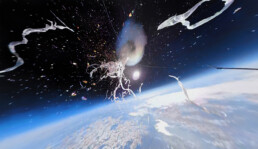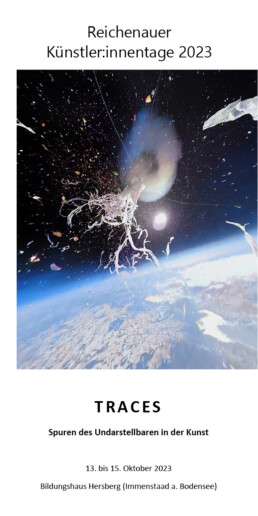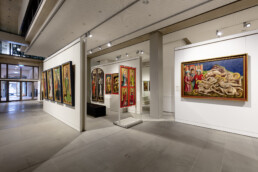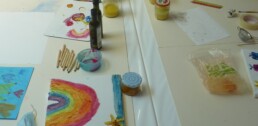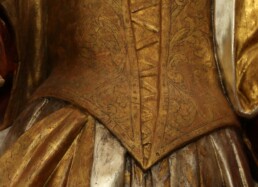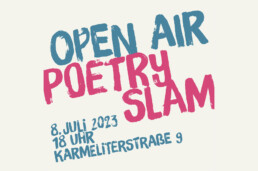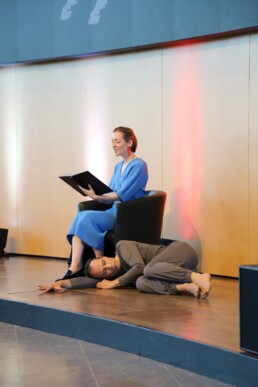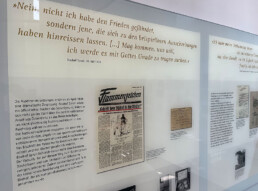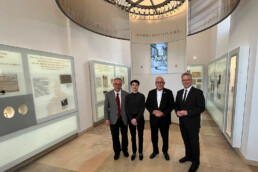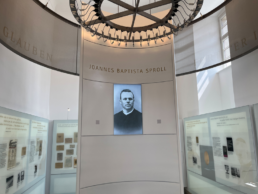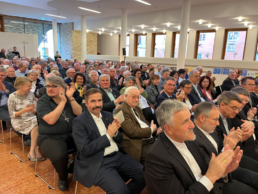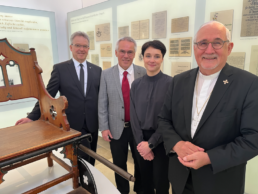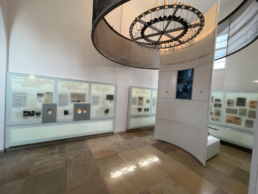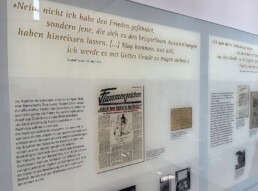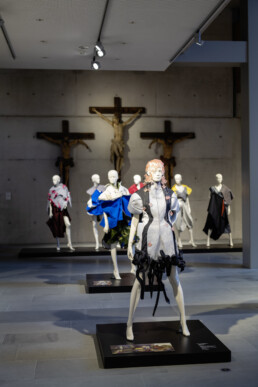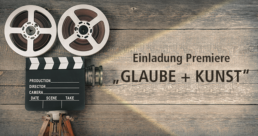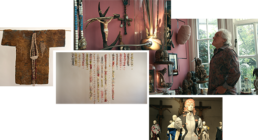Reichenau Artists’ Days
Ideas of what is sacred have always sought and continue to seek the proximity of the language of art in order to articulate themselves. The “sacred” can initially be understood very openly – with the sociologist of religion Hans Joas as that which can in some way take hold, that which is able to pull individuals or communities beyond themselves. And in such experiences of “self-delimitation or self-exaggeration” then lies an “affective certainty”: a certainty in which – “binding force” develops “whose strength goes beyond everyday experiences” (Hans Joas, Die Macht des Heiligen, 2017, p. 434).
Art can therefore be understood as opening a sensual access to the permanently nonsensual sacred, evoking in a corporeal-material sense, paradoxically representing the transcendent: in its unrepresentability. Art that sees itself in this way is always more than a visual or perceptual object. Their works are powerful media and make themselves and something OTHER appear. They awaken imagination and imagination that goes beyond what is shown, they construct, envision, stage and iconise. That which is thus represented is present and absent at the same time: traces … traces.
The Reichenau Artists’ Days 2023, for which the Kunstverein der Diözese Rottenburg-Stuttgart is responsible, will go in search of traces through listening, seeing, exchanging and reflecting. A search for traces, which the conference will by no means lead to a goal, but which should perhaps be opened at the very beginning. The programme sketches a possible horizon of such a common search for traces and wants to inspire to get involved in corresponding paths.
The preparation team and the board are looking forward to being together in Hersberg. We also welcome the members of the Community of Christian Artists from the Archdiocese of Freiburg.
For further information on registration and the programme, please see the attached flyer.
Image caption:
Marie Lienhard
Video still: gold explosion (Excerpt)
© VG Bild-Kunst, Bonn 2023
Das Diözesanmuseum sucht eine Museumsaufsicht (m/w/d)
Für das Diözesanmuseum Rottenburg suchen wir zum nächstmöglichen Zeitpunkt
eine Museumsaufsicht (m/w/d)
(in Teilzeit 40%, derzeit 15,8 Wochenstunden)
befristet bis 31.07.2024
Das Diözesanmuseum Rottenburg beherbergt sakrale Kunst vom 2. bis 21. Jahrhundert, darunter Werke von europäischem Rang. Neben den Gemälden und Skulpturen des Mittelalters, des Barock und der Moderne, verfügt die Sammlung über herausragende Zeugnisse der Metallkunst, hochwertige Paramente, eine in Umfang und Qualität einzigartige Sammlung von historischen Gläsern, zahlreiche Grafiken, Münzen- und Medaillen sowie vielfältige Zeugnisse der religiösen Volksfrömmigkeit.
Ihre Aufgaben sind insbesondere:
- Aufsicht im Museumsraum
- Betreuung des Kassenbereichs mit Museumsshop
- Besucherinformation und Besucherleitung
- Flexibler Einsatz bei Sonderveranstaltungen (z. B. Getränkeausschank)
Sie bringen mit:
- Interesse am Kulturbetrieb
- Zuverlässigkeit
- Kontakt- und Kommunikationsfreude
- Teamfähigkeit
- Flexibilität
- Fremdsprachenkenntnisse wären von Vorteil
- Bereitschaft, sich in Kenntnisse zur Sammlung einarbeiten zu lassen
Wir bieten Ihnen ein abwechslungsreiches Tätigkeitsfeld und die im öffentlichen Dienst üblichen Sozialleistungen wie z.B. Zusatzversorgung aus der ZVK. Das Angestelltenverhältnis richtet sich nach der Arbeitsvertragsordnung der Diözese Rottenburg-Stuttgart (AVO-DRS), vergleichbar dem Tarifvertrag des öffentlichen Dienstes der Länder (TV-L). Die Eingruppierung erfolgt in Entgeltgruppe 2.
Die Identifikation mit der katholischen Kirche und die Zugehörigkeit zu einer Kirche der christlichen Kirchen (ACK) setzen wir voraus.
Schwerbehinderte Menschen werden bei gleicher Eignung bevorzugt berücksichtigt.
Ihre Bewerbung richten Sie bitte per Mail/per Post bis zum 31.10.2023 an das Diözesanmuseum Rottenburg, Karmeliterstraße 9, 72108 Rottenburg. Ihre Ansprechpartnerin ist Frau Dr. Melanie Prange, Telefon 07472/ 922-181, E-Mail mprange@bo.drs.de. Für Fragen zum Arbeitsrecht steht Ihnen Frau Birgit Saile-Leins, Telefon 07472/169-650, E-Mail bisaileleins@bo.drs.de zur Verfügung.
Summer holiday programme of the town of Rottenburg
Dragon’s blood and purple snail, inkstone and hen’s egg – painting like in the Middle Ages
We take a trip into the exciting world of the Middle Ages and explore the paintings of the Diocesan Museum.
In the process, we learn all kinds of strange stories, colours and materials. Afterwards, we will build a stretcher frame out of wood and canvas and make our own paints – of course, we can also paint with them.
For children 8–10 years
When: Saturday, 05 August 2023, 11.00 – 14.00 hrs
Meeting point: Diocesan Museum Rottenburg,
We “sniff” through the museum and then go together to the KunstGasse: all children can also be picked up there. You will find the entrance to our KunstGasse directly to the left of the Theo bookshop (Karmeliterstr. 2, Rottenburg).
Cost: Free admission to the museum. Material contribution: 6 euros per person.
Please bring a snack and something to drink: A snack and something to drink, clothes that can get dirty.
Currently there are still a few places available.
Feel free to contact the museum if you would like to have a little adventure with brush and paint. We look forward to seeing you!
Depictions of the Virgin Mary throughout history
Starry wreath, protective cloak, breastplate – depictions of Mary throughout history
What is behind the Mary in St. Michael in Tübingen?
In St Michael’s there have been considerations for some time to replace the figure of Mary in the church – after all, according to the conviction of some, it is not a representation of Mary. So that the congregation and the parish council can form their own opinion, Dr Melanie Prange, diocesan curator and director of the Diocesan Museum Rottenburg, will report on representations of Mary throughout history and the connections with the image of women at the time.
Place: Parish Hall St. Michael
Date: 13 June 2023, 7.15 pm
Photo: Madonna with crown and sceptre, 2nd half of 18th century, Hohenheim, St. Antonius, © Diözesanmuseum, Fachstelle Kunstinventarisierung
Tangible delicate – Vernissage with Poetry Slam
A world full of poetry
The Diocesan Museum’s garden and exhibition spaces will be the scene of bold contrasts and surprising encounters this summer. From fragile glass bubbles clinging to rough alabaster surfaces to bronze figures radiating gentle delicacy – in the works of Susanne Roewer, the most diverse, seemingly incompatible materials come together to form a poetic unity. The exhibition Tangible delicate (8 July – 14 October 2023) in Rottenburg shows sculptures and installations by the Berlin sculptress that defy the rules of gravity and enchant the viewer with their grace and powerful fragility.
We cordially invite you to the opening of the exhibition with a poetry slam on Saturday, 8 July, 6 pm!
Poetry slam is performed stage literature. Different poets from all over Germany will meet in the garden of the museum and seminary. A firework of poetry and prose, sometimes performed loudly, sometimes quietly. And as always, the audience decides who wins the evening.
The evening will be moderated by Asli Kücük, Landestheater Tübingen, and Wehwalt Koslovski, poetry slam pioneer and world champion. Since 1994, Koslovski has performed over 2500 times on stages in Europe, the USA and Japan. He lives and works as a freelance stage poet, reciter, literary organiser, lecture traveller, speech & language coach and art teacher in Berlin.
Creation myths in motion
For all those who could not experience it or would like to experience it again – the performance “Telling of our beginnings. Creation myths in word, music and dance” with Felix Grützner (dance) , Patrick Bebelaar (piano) and Julia Hölzgen (spoken word artist) is now available on YouTube:
Ceremony at the Bishop Sproll memorial
"Is and remains a role model in faith"
With a ceremony on Tuesday evening, Bishop Dr Gebhard Fürst opened the memorial for Confessor Bishop Joannes Baptista Sproll.
With a ceremony on Tuesday evening, Bischof Dr. Gebhard Fürst opened a memorial for his predecessor in office, Johannes Baptista Sproll, who was the only bishop in Germany to be banned from his diocese by the National Socialists. The interest in the new memorial in the Episcopal Ordinariate was so great that the chairs provided in the foyer were not enough to seat everyone.
Bishop Sproll and his faith-based resistance to the Nazi dictatorship must not be forgotten, Fürst emphasised in his welcoming speech. In the presence of the former Minister President of Baden-Württemberg, Erwin Teufel, he recalled that in 2006, during a joint visit to the memorial for the witnesses of faith of the 20th century in Rome, one of the stones was laid. In 2006, during a joint visit to the memorial for the witnesses of the 20th century in Rome, one of the stones with which the Nazis had broken the windows of Bishop Sproll’s study in the former episcopal palace in 1938 was laid down.
Remembrance needs a place
“Remembrance needs a place, especially in Rottenburg, at the bishop’s seat. That is why the establishment of this memorial right here is very close to my heart and I am very pleased that we now have an outstanding memorial here,” Bishop Fürst stated in his address and recalled that beatification proceedings for Bishop Sproll were opened in 2011, which “hopefully will be decided positively”.
The exhibition designed by Dr Melanie Prange, director of the Diözesanmuseum, and Dr Herbert Aderbauer from the Diözesanarchiv, with the assistance of the Stuttgart office “von Jacobs. Ausstellungsgestaltung – Innenarchitektur”, invites visitors to an introduction to the work of Bishop Sproll through seven chronologically arranged thematic areas with texts, pictures and objects. In addition, the exhibition offers visitors the opportunity to learn more about Bishop Sproll through a multimedia presentation and guided tours.
Orientation and role model
“The memorial is designed for a large public: Groups can and should also come. Especially for school classes, a visit would be relevant for history and religion classes on the topic of Christian faith and resistance,” the Bishop of the Diocese of Rottenburg-Stuttgart emphasised, referring to Sproll’s attitude to topics such as racism and nationalism, which also provides orientation and a role model for the coming generation, as well as Sproll’s commitment to peace. It was of particular importance that Bishop Sproll did everything “entirely out of his Christian faith”, Bishop Fürst emphasised. “He is and remains a role model in faith.”
Besides Cardinal Count von Galen, Sproll was the only bishop who publicly and resolutely stood in the way of the National Socialists – and did so earlier than von Galen, Fürst emphasised, recalling that Sproll had been revered for decades by the population of the Diocese of Rottenburg-Stuttgart as a confessor bishop who resisted National Socialist ideology.
Outside the diocese, however, Bishop Sproll is unfortunately still too little known. “We must therefore continue to make it our task to make his attitude and his deeds generally known: The memorial is intended to contribute to this,” Bishop Fürst said, pointing out that against this background the memorial takes into account the need for remembrance, recollection and also for bringing him into the present.
A special room
Vicar General Dr. Clemens Stroppel summed it up in his invitation to visit the memorial site after the official part of the opening ceremony, which was musically accompanied by a clarinet quintet of the Rottenburg town band: The memorial site is located at the place where Bishop Sproll was taken away by the National Socialists, to which he returned after the end of the Nazi regime and the time of his exile, and at the place where he was laid out after his death before being buried in the bishop’s crypt of the Sülchenkirche.
The new memorial has thus been created on a historical site in the entrance area of the former episcopal palace. “It is the entrance hall to the bishop’s former home and thus the inside of the large wooden portal that the Nazis smashed in 1938 when they stormed the house to force Bishop Sproll to leave his diocese,” Dr Herbert Aderbauer recalled.
Dr Dominik Burkard, professor at the Julius Maximilian University of Würzburg and chairman of the History Association of the Diocese of Rottenburg-Stuttgart, went into detail in his lecture entitled “Rottenburg – Rome – Berlin. The ‘Sproll Case’ in the Focus of Diplomacy” at the opening ceremony, he explored the question of what was done on the part of the Vatican to come to Sproll’s aid. “Did they do anything at all or did they leave the bishop of Rottenburg ‘out in the cold’?” asked Burkard.
Note
The memorial is a branch of the Diocesan Museum in Rottenburg, where further information can be obtained by calling +49 7472 / 922180 and -82 or by emailing museum-sprollgedenkort@bo.drs.de.
Creation Myths | Concert with Dance
On Sunday, 14 May at 5 pm, the Diözesanmuseum invites you to experience creation myths in text, word and dance. The creation myths of the great world religions as well as the creation texts from the Kabbalah, contemporary literature and the natural sciences tell of the beginnings of human life. The life dancer Felix Grützner transforms these texts into movement, accompanied on the piano by Patrick Bebelaar. The linguistic framework is provided by the spoken word artist Jule Hölzgen (Academy for the Spoken Word https://gesprochenes-wort.de/ ).
The Easter Nest – The Bunny a Cunning Egg Thief?
Where does it come from that the Christian Easter is combined with colourful chicken eggs and bunnies? We go in search of clues from BUNNY to BUNNY at Kruzifix! Facts and facets.
Premiere: "Faith + Art"
Film premiere "FAITH + ART"
Dear Ladies and Gentlemen,
I cordially invite you to the premiere of the documentary film “GLAUBE+KUNST” and look forward to diving into the reciprocity of faith and art together with you and to exploring the question of whether “religious art” is still possible at all today.
Your Bishop Dr Gebhard Fürst
Venue: EM cinema – city centre cinemas, Bolzstraße 4, 70173 Stuttgart, Germany
Date: 24 March 2023
Admission from 6.00 p.m., start 6.30 p.m.
Summary
The multifaceted interplay between faith and art is the subject of this documentary: How transcendent is art? How much aesthetics does faith require? Is “religious art” still possible at all, and if so, how?
Faith + Art approaches these questions with works from different epochs of art history – from the late Middle Ages to the present. In the process, it becomes apparent that there is a continuity of themes across the centuries. The fragility of human existence is a fundamental experience that inspires artists to this day. It is reflected in Matthias Grünewald’s Isenheim Altar, which was created more than 500 years ago, as well as in Joseph Beuys’ installation Zeige Deine Wunde (Show Your Wound) from 1976.
What is the common ground? What separates them?
In addition, the film visits artists in their studios and interviews them about their work and their motivation to deal with questions of faith in art.
Documentary: 45 minutes
Director: Dominik Wessely
The screening will be followed by a short discussion with director Dominik Wessely and Bishop Dr. Gebhard Fürst.
Registration at: https://www.kbw-stuttgart.de/veranstaltungen/240323-glaube-kunst/
